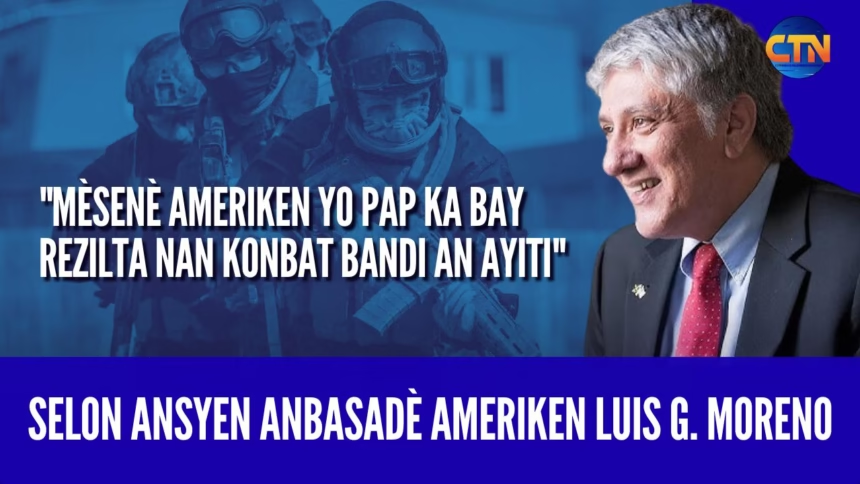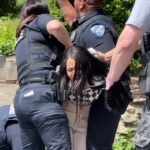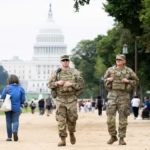Former U.S. Chargé d’affaires in Haiti, Luis G. Moreno, provided a candid analysis of the security crisis ravaging the country.
In an exclusive interview with Emmanuel Paul of CTN, he stated that only a combination of the Haitian National Police and an international professional military force could truly push back the gangs and restore order. According to him, sending a few hundred American mercenaries would not be sufficient to resolve such a complex situation.
Moreno also commented on Washington’s recent announcement promising a $5 million reward for information leading to the arrest of Jimmy “Barbecue” Chérizier. While he considers this gesture symbolically strong, he emphasizes that the measure remains largely ineffective without a real capacity to execute it.
The former diplomat also mentioned the growing tensions between the United States and Venezuela, believing that this development could draw renewed attention to the Caribbean region and, he hopes, to Haiti.
Finally, when asked about a possible renewal of Temporary Protected Status (TPS) for Haitians, Moreno acknowledged that there are encouraging signs, while reminding of the unpredictability of the American administration.
Read the complete transcript of the interview to discover his detailed remarks.
Interviewer: Great to see you again. I’m glad you agreed to speak with us a second time. The first interview was a pleasure; everyone was satisfied with it. Some of your friends were eager to see you again. So today, it’s a real pleasure to have you back. Since our last conversation, have you received any calls regarding the situation in Haiti? Is there any news?
Ambassador Moreno: Yes. I speak with people in Haiti at least several times a week. I have friends in Cité Soleil; I had friends who lived in Paco—they no longer live there. I also speak with members of the Haitian diaspora in Miami, New York, and other places. Every time you or others ask me this question, I must say the same thing: the situation has never been worse.
We’re approaching 8,000 deaths in the last 18 months, 7,000 rapes, 200 to 300 kidnappings, and nearly a million displaced people. Ninety percent of Port-au-Prince is controlled by gangs—by Jimmy “Barbecue” Chérizier and VIv Ansanm.
Despite the $5 million reward offered by the State Department, Barbecue isn’t afraid to appear in public. Just this weekend, he was seen with another gang leader, with whom they were previously fighting, now appearing to reach some kind of agreement. This is very concerning.
The Haitian police are completely overwhelmed. The drone program has yielded mixed results, sometimes negative ones. Politicians like Moïse Charles openly threaten to take up arms against the Transition Council if things don’t go their way. Schools in Cité Soleil are struggling to stay open; some only have peanut butter and rice to give to the children. The airport opens intermittently, but American flights are not permitted. The port is controlled by gangs. Meanwhile, the international community, CARICOM, the OAS, and even the American government don’t seem to be acting with the required urgency, despite the current humanitarian and security catastrophe.
Interviewer: Mr. Ambassador, what you’re describing seems even more serious than most assessments. But there has been a change in the CPT, where Laurent Saint-Cyr now holds the presidency. The executive is now led by two members from the private sector. Is this someone you knew during your mission in Haiti? What are your expectations?
Ambassador Moreno: I am certain I have met them. There are advantages, I suppose, but also disadvantages to placing private sector figures at the helm. I don’t believe this aligned with the original vision that emerged from the discussions at Hotel Montana, which aimed for broader civil society representation. Concentrating power solely in the hands of the private sector is concerning.
And frankly, I don’t see how we could meet the February deadline for organizing elections. The transition council is supposed to hand over power to a duly elected president, but there is no secure environment for a vote to take place in just seven or eight months.
“Foreign mercenaries collecting taxes from the Haitian people? I had never heard of such a thing”
Interviewer: This brings us to Eric Prince. Last time, you revealed right here that he was in negotiations with the Haitian government. We now know more: a 10-year contract, 200 mercenaries, involvement in tax collection, among other things. What are your thoughts?
Ambassador Moreno: I’m glad you asked that question. Yes, this was first mentioned here. One of my favorite expressions in Haitian Creole is moun ap fè magouy (“people are scheming”), and this is a perfect example.
Eric Prince—the brother of Betsy DeVos, who was Secretary of Education during Donald Trump’s first term—has given more than $250,000 to Trump’s Super PAC. He has consistently obtained government contracts connected to Trump. Recently, he even proposed a $35 billion plan for mass deportations.
The details of this contract in Haiti remain secret. It supposedly covers everything: snipers, helicopters, drones, and incredibly—even tax collection. Foreign mercenaries collecting taxes from the Haitian people? I had never heard of such a thing. If this were legitimate, the council would have published the complete terms. Instead, everything remains shrouded in secrecy.
And I think, yes, you are absolutely right. If it were possible to obtain exemptions to this embargo and allow heavy weapons and training to be provided by regular U.S. police forces, or by the U.S. military, or by contingents from CARICOM—but only by genuine military professionals, not by a private company whose sole objective is to make money and secure contracts—then that would make sense. Otherwise, it’s senseless and can only lead to negative consequences.
“All of this looks more like an agreement designed to keep the CPT and the Prime Minister in power”
Do you have any information about the amount or terms of this contract signed with contractor Erik Prince? For now, these details remain secret.
Ambassador Moreno: I don’t know the exact content, but I assume we’re talking about substantial sums. As I mentioned before, there could even be kickbacks linked to this contract. Of course, everything might be proper and perfectly legal, but I strongly doubt it. All of this looks more like an agreement designed to keep the CPT and the Prime Minister in power, similar to the lobbying contract, this time entrusted to Prince, to then claim that everything is fine and justify keeping these leaders in power—much more than a sincere effort to support the population.
They are spending enormous sums on lobbying groups, Washington personalities, and supposed “think tanks” that produce reports that have been written hundreds of times before, and this in full view of the National Security Council, the State Department, and many other American agencies. I think you are absolutely right: the real objective is to preserve certain leaders in power. And as I said, the February deadline for the arrival of a new president through credible elections seems unrealistic to me.
Do you think there’s a chance that CPT members could be removed, and we could turn to an institutional solution, for example through Haiti’s Court of Cassation? Because the current formula, with nine leaders of whom three face serious corruption allegations, is absolutely not working.
Ambassador Moreno: I would like to hope so. It’s obvious that the system in place today is ineffective and accomplishes nothing. And you’re right, corruption allegations are widespread, which is inevitable in such a situation. We’ve seen the arrest of Réginald Boulos in Miami by American authorities, on suspicions of collusion with gangs in Haiti. This demonstrates that this system is incapable of ensuring a genuine transition toward stable governance. Haitians must understand that the international community no longer really shows the willingness to get involved, and they will have to find a solution themselves.
It’s also in this context that the Trump administration is asking the United Nations to study the possibility of a mission fully supported by the Security Council. Do you think this could succeed? The last time, under the Biden administration, China and Russia opposed it. Perhaps with the rapprochement between Donald Trump and Vladimir Putin, there would now be a chance to bring Moscow and Beijing on board?
Ambassador Moreno: I don’t know. But we shouldn’t forget that it wasn’t just China and Russia that posed a problem. It was also the lack of political will from other actors, including the Biden administration itself. Certainly, the Russians and Chinese vetoed it at the Security Council, but the difficulty went well beyond that. As for this Trump-Putin rapprochement, I don’t know how long it will last or how solid it will be. Putin is a cunning strategist who is mainly trying to buy time in Ukraine to achieve his objective: the conquest of the entire country. That hasn’t gone well for him so far. If Trump managed to overcome Chinese and Russian objections, and convince allies to participate in an international stabilization force, all the better. But I don’t see this as a priority for the current administration.
Interviewer: Last time, you mentioned that the international community would only mobilize if a major event occurred in Haiti. Do you think the situation has evolved since then? Is there more attention on Haiti?
Ambassador Moreno: I must remain realistic, even if it appears pessimistic: I don’t see any notable change. The situation on the ground continues to worsen. Each day, we hear that “it’s never been this bad,” then the next day, “it’s never been this bad.” The world remains focused on other priorities. And I’m still struck by the United States’ ability to ignore such a massive humanitarian catastrophe in a country with a considerable diaspora, just 55 minutes by flight from Miami. How can one turn a blind eye to a population threatened by famine and plagued by widespread violence?
Let’s be honest: I don’t see any change coming. The only positive element is the presence in Port-au-Prince of an excellent diplomat, Chargé d’Affaires Henry Worooster. He’s an experienced man, accustomed to complex situations, and I’m convinced he will keep Washington informed about the severity of the crisis.
How do you view the role of mercenaries? About 200 soldiers are expected to be deployed, but this could lead to heavy casualties. We think of precedents in Afghanistan or Iraq, where mercenaries faced severe criticism due to repeated human rights violations. In Haiti, the situation could be even more perilous, as there is virtually no accountability. Do you see a risk of massive losses?
Ambassador Moreno: Yes, absolutely. The risk is immense. It’s a predicted catastrophe. The potential for things to go wrong is enormous, and I’m truly concerned about how this could unfold. These soldiers are arriving without any real experience of the Haitian terrain. This isn’t Afghanistan or Iraq: here, operations take place in densely populated areas, in direct contact with numerous innocent civilians. It’s a perfect recipe for disaster, involving the Haitian police, the United Nations, and Erik Prince’s mercenaries.
Question: In your opinion, who currently has the best chance of helping resolve the crisis in Haiti? If you had the choice, who should intervene?
Ambassador Moreno: I have always maintained, Emmanuel, that assistance to Haiti’s National Police must be provided by a professional military force. This force should support the police by providing weapons, helicopter transport capability for personnel, a rapid reaction force, and the ability to sustainably secure neighborhoods once gangs are expelled. Simultaneously, we need to strengthen and increase the Haitian police force so they can establish permanent posts in liberated areas.
In my view, it’s therefore about the Haitian National Police, but supported by professional soldiers or specialized police forces, and this needs to be on a much larger scale than what we’re currently seeing. Four hundred and sixteen Kenyan police officers will not be sufficient to solve the problem.
Question: Before we conclude, do you have any other information about Haiti to share with us? Last time, you gave us news about Erik Prince even before the New York Times published it…
Luis G. Moreno: I would say that the United States’ decision to offer a $5 million reward for information leading to the arrest and conviction of Jimmy “Barbecue” Chérizier is not a bad thing. However, it also demonstrates how ineffective such measures are when there’s no one truly capable of taking action. We saw him moving freely all weekend, appearing with different people, making videos, without being troubled.
A prediction I’d like to make on your show is that we will likely soon have significant news regarding Venezuela and the United States – perhaps within the week or the next ten days. Three American destroyers are currently heading toward Venezuelan waters. This is a serious development, and it could draw increased attention to the Caribbean region as a whole. Hopefully, this will also help shine a spotlight on Haiti.
But returning to this bounty: who will actually execute it? If the Haitian National Police can’t arrest him, and if the Kenyan mission fails to do so as well, who is supposed to collect these $5 million? Do the United States expect someone to capture him and deliver him to the American embassy in Port-au-Prince?
It’s actually mostly symbolic. For instance, they did the same thing with Nicolás Maduro: there’s a $10 million bounty on his head. This is a long-standing State Department program that dates back to the era of the Cali and Medellín cartels, and Pablo Escobar. So it’s more about sending a message than an actual execution operation.
Question: Do you think the Trump administration might extend the Temporary Protected Status (TPS) for Haitians, even if just for one year?
Luis G. Moreno: There are some indications pointing in that direction. But let’s be honest: the Trump administration hasn’t exactly been a model of consistency. What’s true today might not be true tomorrow, and even less so the day after. So yes, there’s a possibility that TPS might be extended, but I wouldn’t place too much confidence in the stability of such a decision.
Interviewer: Thank you very much, Mr. Ambassador. It’s always a pleasure to have you.
Luis G. Moreno: The pleasure is mine. Thank you very much.
https://ctninfo.com/?p=36426&preview=true
https://x.com/CtNinfo/status/1960182578872230229








